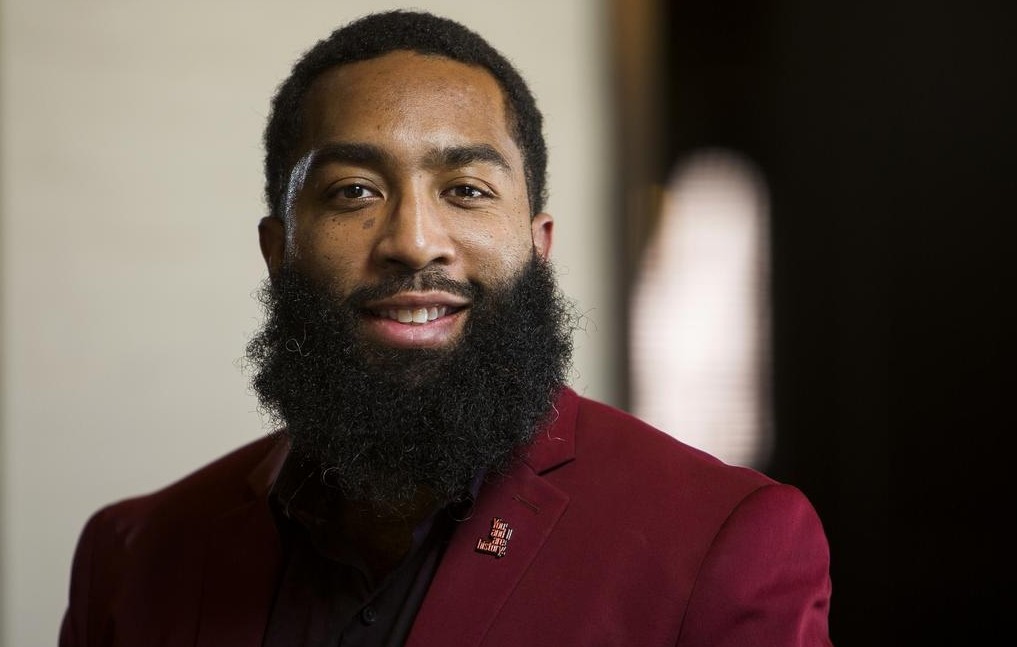
Dr. Steven Kniffley named senior associate dean for DEI at the College of Medicine
Psychologist previously served as chief diversity officer at Spalding University
Steven Kniffley Jr., PsyD, an expert on the treatment of race-based stress and trauma, has been named senior associate dean for diversity, equity and inclusion (DEI) at the University of Cincinnati College of Medicine. Kniffley currently serves as chief diversity officer at Spalding University in Louisville, Kentucky, and as an associate professor at its School of Professional Psychology.
Kniffley begins his new role on May 8.
“Since 1819, the College of Medicine has been indispensable as a member of the medical community. It is an honor to join the college family and I am excited about the opportunity to support the college’s mission, vision and values,” Kniffley says. “Specifically, I am looking forward to supporting the College of Medicine in becoming a transformational social change agent for historically marginalized and underrepresented communities.”
“Dr. Kniffley brings an extraordinary range of talents and expertise to this position. I know that his experience and extensive clinical work will lead to greatly improving the College of Medicine’s overall DEI program and help to make everyone here feel a strong sense of inclusiveness and belonging while creating a more diverse community,” says Andrew T. Filak Jr., MD, senior vice president for health affairs and Christian R. Holmes Professor and Dean of the College of Medicine.
During the interview process, Kniffley says he noticed three DEI strengths at the College of Medicine: awareness, openness and commitment.
“During my conversations, each individual I spoke with demonstrated an awareness of the sociocultural climate influencing current education, training and research needs and pedagogy. Each expressed an openness to learning about DEI best practices within the higher education context. Lastly, everyone I had discussions with recognized that awareness and openness requires action to create systemic change,” Kniffley says. “This desire to create systemic change demonstrates a commitment to transform the College of Medicine into a leading education, training and research institution that values cultural differences, encourages advocacy and affirms a social justice oriented perspective.”

Steven Kniffley Jr., PsyD
Kniffley says he sees three areas of growth in DEI in the medical field and, specifically, at the College of Medicine. These are representation, training and policy development. While gains have been made for the representation of women in the medical field, it continues to be dominated by older white men, he notes. Meanwhile, the number of ethnic and racial minorities has generally been stagnant at most medical schools, but he feels the college can create a diverse workforce pipeline by recruiting and retaining more diverse students and faculty who can be more representative of the individuals the college serves. He says a more diverse medical field is needed to competently and compassionately support increasing diversity as reflected by the U.S. population. He also sees the potential to change college policies that have served as barriers to the recruitment and retention of historically minoritized students and faculty. Improved training of students in culturally competent care can be achieved by promoting a more culturally inclusive curriculum that amplifies the voices and contributions of historically minoritized individuals and encourages skill development in culturally competent care and research.
“The College of Medicine has the opportunity to be a leader in regards to the development of meaningful policies that balance maintaining the training rigor needed for the development of competent medical professionals with the inclusive posture needed to recruit and retain a diverse student population,” Kniffley says.
In addition to his role as senior associate dean, Kniffley will serve as an associate professor in the Department of Psychiatry and Behavioral Neuroscience. He will continue his clinical work as a child, adolescent and family psychologist specializing in working with Black male youth by providing spaces of evidence-informed and culturally humble healing for racial trauma, anger and aggression, and racialized masculinity exploration and development.
Kniffley also plans to continue his research into youth racial trauma, with a focus of developing clinical interventions and assessments for the treatment of racial trauma in Black, Indigenous and people of color (BIPOC) youth.
“Our lab has developed the only evidenced-based 16-week manualized racial trauma treatment protocol for BIPOC youth ages 6 to 12 that has been adopted by several state child mental health agencies, including Kentucky and Connecticut,” he says. “Additionally, our lab has developed several measures to assess for the impact of racial discrimination—the Collective Care Center Youth Discrimination Scale—and internalized racism—Collective Care Center Internalized Racism Projective Measure. To date, the youth racial trauma research lab has trained over 1,000 clinicians in our manualized racial trauma treatment protocol across nine countries.”
A native of Louisville, Kniffley completed doctoral and master’s degrees in clinical psychology at Spalding University, where he was selected as Spalding’s first American Psychological Association Minority Fellow. He also completed a master’s degree in public administration at Wright State University. Kniffley was a postdoctoral psychology fellow at Cambridge Health Alliance at Harvard Medical School and is board certified in clinical psychology. He has written numerous books, chapters and articles on Black male mental health, Black males and the criminal justice system, and academic achievement. He is a frequent public speaker at seminars and training workshops on these issues.
Kniffley and his wife, Brittney Hunt, have a 3-year-old son, Justice, who they adopted in 2021. Their family also includes a dog named Huey and a cat, named Angela Davis. Kniffley is a Crossfit trainer, an avid runner who has finished a dozen half marathons with hopes of competing in an Ironman competition soon, and is an avid bike rider totaling about 150 miles a month. He enjoys reading books on topics related to social justice, leadership, religion and Black studies, with James Baldwin being his favorite author. He also enjoys Star Wars, Lord of the Rings and “all things Marvel,” with Black Panther as his favorite superhero.
Related Stories
SELF: 6 things you should know about exercise and the COVID-19 vaccines
May 4, 2021
Carl Fichtenbaum, MD, of the UC College of Medicine Division of Infectious Diseases, was one of the sources cited in an article published by SELF on six things to know about exercise and COVID-19 vaccines.
Fox19: World Voice Day with UC Health
April 15, 2021
Rebecca Howell, MD, of the Department of Otolaryngology-Head and Neck Surgery in the UC College of Medicine, was interviewed by WXIX-TV, Fox19 about World Voice Day coming up on Friday, April 16.
Cincinnati.com: It's spring. You're vaccinated. We asked docs what they feel is safe, what they'd avoid
April 12, 2021
Jennifer Forrester, MD, of the UC College of Medicine Division of Infectious Diseases was one of the expert sources cited in an article on Cincinnati.com on how safe or unsafe doctors feel certain activities are as we get into spring and more and more people are vaccinated against COVID-19.
The Body: How one Black woman wrestles with vaccine hesitancy
April 20, 2021
Carl Fichtenbaum, MD, of the Division of Infectious Diseases at the UC College of Medicine was one of the sources cited in an article published in The Body about the author's concern about getting the COVID-19 vaccine. Fichtenbaum stressed the safety and efficacy of the vaccines and said they would not interere with treatments for cancer and HIV/AIDS.
UC Day of Giving a success
April 28, 2021
University of Cincinnati Day of Giving’s 24-hour challenge was a tremendous success this year, raising $2,219,197 with 3,232 gifts. The fourth annual UC Day of Giving raised its most money to date with alumni, donors, students, faculty and staff joining together to support UC and UC Health.
Medscape: New study confirms kidney dialysis worsens pregnancy outcomes
April 30, 2021
Silvi Shah, MD, of the Division of Nephrology, Kidney CARE Program, at the UC College of Medicine, was cited as a source in a Medscape story on new research showing that kidney dialysis worsens outcome for pregnant women.
President picks exceptional talent
April 28, 2021
The University of Cincinnati 2021 Presidential Leadership Medal of Excellence Awards honor six undergraduate scholars for scholarship, leadership, character, service and the ideals of the university. Awardees are spotlighted for exceptional academics, creativity, community service and innovation.
Grad students earn president's highest honor
April 28, 2021
The University of Cincinnati 2021 Presidential Medal of Graduate Student Excellence Awards honor three graduate scholars for scholarship, leadership, character, service and the ideals of the university. Awardees are spotlighted for exceptional academics, creativity, community service and innovation.
WCPO-TV: Experts: Reopening states still far from herd immunity
June 8, 2021
Masks are coming off in Ohio, Kentucky and Indiana, thanks to widespread availability of the COVID-19 vaccine and politicians’ increasing willingness to let unvaccinated people roll the dice on their own health. WCPO-TV interviewed Carl Fichtenbaum, MD, of the UC College of Medicine Division of Infectious Diseases who said any amount of vaccination is helpful in preventing the novel coronavirus from spreading, but unvaccinated people are still in danger as social gatherings and indoor events resume.
Cincinnati.com: COVID-19: When will Ohio gain protective herd immunity from vaccines? Doctors can't be sure
April 6, 2021
Carl Fichtenbaum, MD, of the Division of Infectious Diseases at the UC College of Medicine was one of three experts Cincinnati.com turned to on a story about when Ohio will gain herd immunity against COVID-19.
